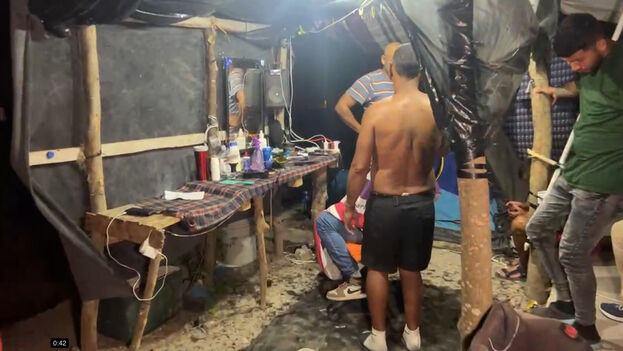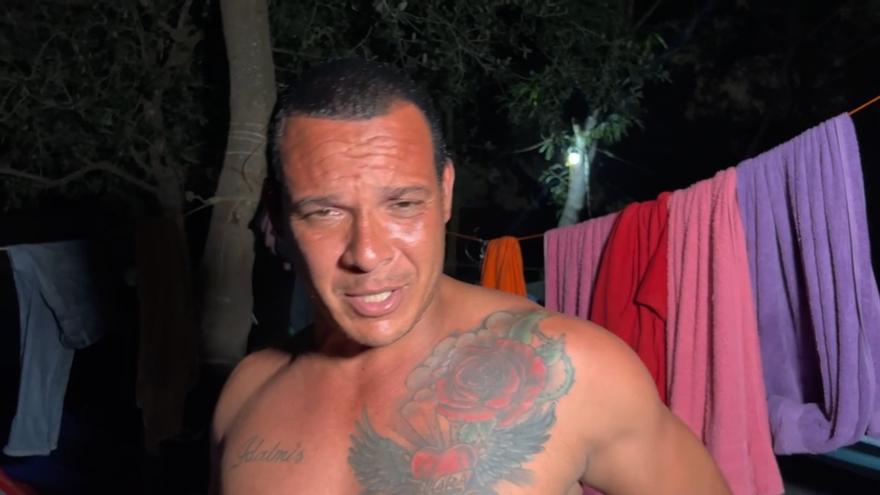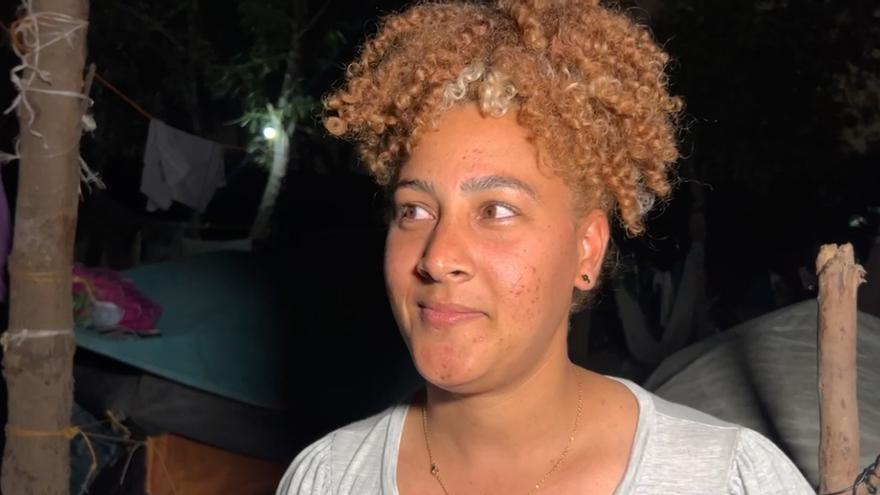
![]() 14ymedio, Havana, 9 May 2023 — Among tents improvised with blankets and tree branches, five Cubans are waiting for a response to their CBP One [US Customs and Border Patrol] appointment at the migrant camp in Matamoros. “I’m not going to risk crossing the Rio Grande and being deported,” says this Island national who has the name “Idalmis” tattooed on his chest.
14ymedio, Havana, 9 May 2023 — Among tents improvised with blankets and tree branches, five Cubans are waiting for a response to their CBP One [US Customs and Border Patrol] appointment at the migrant camp in Matamoros. “I’m not going to risk crossing the Rio Grande and being deported,” says this Island national who has the name “Idalmis” tattooed on his chest.
Idalmis fled Cuba almost four years ago. In an interview with ImpactoVision journalist John Ritchie, he says that “the police were after me,” that he owes “a very large amount for the clothes he was selling” and that if he is returned to Cuba, he will go to jail.
He left his children and his mother in search of a better future because “the situation in Cuba is very bad, terrible like nowhere else,” he emphasizes, while describing the Government’s attitude as “lack of respect.” “If you have money, there is no food or medicine, and when you want something, you don’t have dollars.”

Only the Rio Grande separates this Cuban and his wife from Brownsville, one of the Texas cities that together with El Paso and Laredo have declared a state of emergency before the end of Title 42 on May 11. The measure, activated by then-President Donald Trump under the argument of preventing the entry into the country of people with COVID-19 — but which served in practice to expel migrants without having to accept their asylum applications — will be replaced by other measures established by the current administration. The U.S. government is increasing the ways of legally applying for an entry permit but promises to toughen the penalties for those who enter irregularly.
Idalmis says that the journey has taken him through 11 countries. “I went through Suriname, Brazil, Peru, Ecuador, Colombia, the Darién jungle, Costa Rica and Honduras, until I arrived in Mexico. The section between Tapachula and Mexico City has been a greater obstacle than crossing the Darién jungle” due to extortions, kidnappings and threats along the way.
Idalmis has a brother in Nebraska, and he says excitedly: “At least we already have a job. The delay for us is to be able to legally enter the United States and arrive.”
Next to this couple is a woman who preferred not to give her name. She left the Island four months ago by way of Nicaragua. “The flight was $2,300, although others have paid $3,000 and up to $6,000,” she says. “You’re not going to return but you still have to buy a round-trip ticket.”
These people are waiting for information about migration. They perceived movement on the Brownsville side last Sunday, just on the day that Joe Biden’s U.S. government ordered the deployment of another 1,500 soldiers in support of 2,500 National Guard agents that will be distributed along 1,926 miles of the U.S.-Mexico border.
“None of us is going to cross, because it means risking deportation,” says the Cuban, who traveled alone “because the money was not enough for my husband’s flight.” Since Monday, none of the migrants, mostly Venezuelans, have tried to cross the Rio Grande.

Gladis Cañas, representative of the association Ayudenles a Triunfar [Help Them Succeed] tells 14ymedio that before the end of Title 42 many people tried to swim across the Rio Grande, and, unfortunately, two people died in the attempt. “Aspiring to the American dream should not be synonymous with death,” she says, adding that the CBP One application “has had many deficiencies and errors and has caused migrants to take wrong decisions that can truncate their process.”
The Cubans know that as of this Thursday, May 10, CBP One will have approximately 1,000 appointments available for 23 hours every day, instead of at a designated time. According to the Customs and Border Protection Office, this measure “will allow greater flexibility, prioritizing non-citizens who have waited longer.”
On the American side, the mayor of El Paso, Oscar Leeser, warned that his officers are preparing for the arrival of thousands of migrants on Friday. “On the street we estimated (that there were) between 8,000 and 10,000 people,” he said during a visit to the border with Ciudad Juárez. “There is a caravan that will probably be here around May 11, so I believe that the real number we will be dealing with will be between 12,000 and 15,000.”
Translated by Regina Anavy
____________
COLLABORATE WITH OUR WORK: The 14ymedio team is committed to practicing serious journalism that reflects Cuba’s reality in all its depth. Thank you for joining us on this long journey. We invite you to continue supporting us by becoming a member of 14ymedio now. Together we can continue transforming journalism in Cuba.
